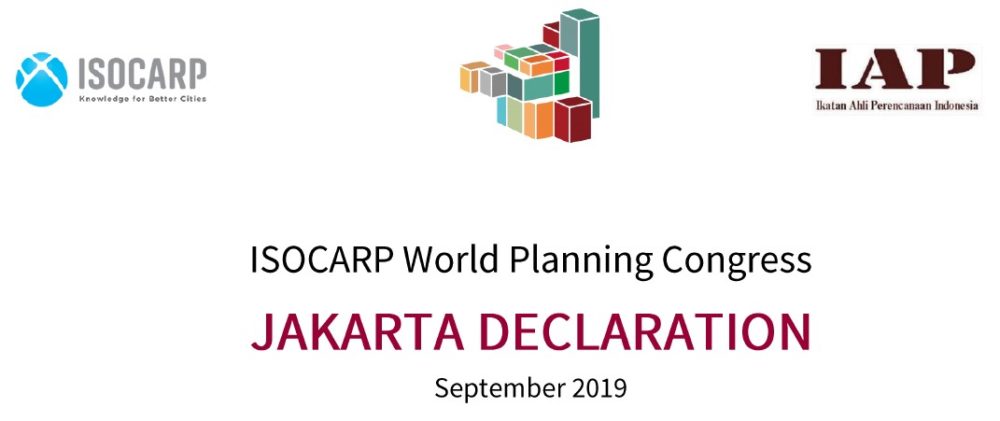We are entering the century of the metropolis. Global metropolitan urbanisation is facing enormous challenges, primarily due to the effects of the current economic development model that makes cities less affordable and unsustainable. Precarious urban informality is increasing at a fast pace due to inadequate legislative, regulatory, institutional and financial frameworks. The management of metropolitan areas is the main challenge for governments, urban professionals and civil societies.
Urban professionals are the key actors to support both decisionmakers and civil society to build the essential frameworks and make large cities affordable, inclusive, resilient, sustainable and safe. The 55th ISOCARP Congress in Jakarta, September 2019, has mobilized collective intelligence of high level international and Indonesian urban professionals to propose solutions for planning the metropolis.
Our Twelve Recommendations
- We advocate that good urbanisation and sustainable cities are the engines of prosperity, wealth and better quality of life for all people and their nations. Planning balanced urbanisation should be a prominent concern for all city and political officials and at the forefront of their agenda, especially as metropolitan areas are a significant contributor to the GDP of the country.
- We call upon all national and local governments to assist other countries in embracing
good and sustainable urbanization, the promotion of carbon-neutral urban development and the care of natural resources. - To move into a more sustainable future, we need a new planning paradigm, and a new model of city-making focused on transformative capacity, equity and speed.
- We ask local and national governments to create and strengthen territorial and metropolitan
technical bodies engaged in advancing governance, knowledge sharing, public debates, urban innovation, and policy-making. - We believe that the planning of new future cities, metropolises and megacities is not just about numbers of people, functions and jobs: it is about working strategically across government levels
and scales from territorial to neighbourhoods, from national drivers to local livelihoods, formal and informal, from macro to micro. - We advocate treating large cities as integrated parts of a wider ecosystem, where solutions can be identified at a systemic level and through the use of local intelligence for identifying locally sensitive climate-adapted solutions before resorting to alien engineering approaches.
- We recognise that without a strong network of interlinkages and interdependencies to the region, a megacity cannot be sustainable. We thus highlight the need for better spatial justice between megacities and their hinterlands to support towns and rural areas.
- We believe that urban planning should support the growth of individuals accompanied by equitable investments at the smallest scale, where public spaces and collective facilities turn into places, co-designed, co-produced and managed at the neighbourhood level and in particular with children.
- We believe that anyone involved in changing cities should aspire to enhance local culture and identity and potentially create a new heritage for the future with real foundations in endogenous values.
- We embrace new technologies which support and augment human intelligence and capabilities, including solutions which improve liveability, equity and transparency.
- We encourage using the tools, methodologies and platforms advocated and created by international, professional organisations and NGO partners, such as the Sustainable Development Goals, their system of indicators and the New Urban Agenda, to move towards metropolitan areas that matter, and where no one is left behind.
- We encourage both national governments and financing institutions to streamline administrative hurdles, risk management and provide the organisational framework that allows complex and multi-level collaboration, including integrated urban investment finance.
We, as a global Society of City and Regional Planners, together with the Indonesian Association of urban and regional Planners, are eager to support the Indonesian decision-makers and the citizens, together with local urban professionals, to envision and contribute to the future development of the Indonesian metropolis and beyond, including the New Capital City. We recommend approaching the complex challenge of managing the metropolis with humility and with respect for people and for natural resources.
